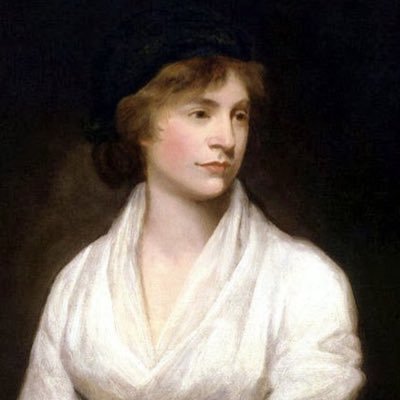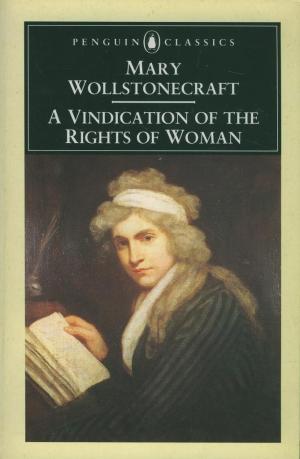A Vindication of the Rights of Woman Summary
7 min read ⌚
 With Strictures on Political and Moral Subjects
With Strictures on Political and Moral Subjects
Another feminist classic.
Hey, did we say another?
We actually meant to say the original feminist classic, Mary Wollstonecraft’s 1792 magnum opus “A Vindication of the Rights of Woman.”
As in: if this book didn’t exist, neither Woolf’s “A Room of One’s Own” nor Beauvoir’s “The Second Sex” and certainly not Friedan’s “The Feminine Mystique” would have.
It’s that important.
Who Should Read “A Vindication of the Rights of Woman”? And Why?
There are some books which we now read chiefly for their historical value, and others simply because we want to see how much effect they have exerted on some more important works which followed them.
Strictly speaking, “A Vindication of the Rights of Woman” falls into both of these categories. It’s one of those books which we read to see how those transhistorical streams of original thought have originated at some point in the past.
In fact, many of Wollstonecraft’s proposed reforms are now obsolete or outdated, and others may even sound chauvinist and sexist to us.
But, ironically, that’s exactly because this book was written at some point in the past. If it hadn’t been, nobody would have been able to think in this manner.
In other words, Wollstonecraft’s book is already a part of your way of thinking.
Read it to find out how it has gradually changed to world.
Read it especially if you are a woman to find out about the struggles and the first mini-victory of your sex.
Because there’s a long way to go still.
About Mary Wollstonecraft
Mary Wollstonecraft was an English philosopher and a proto-feminist, who consciously tried to become “the first of a new genus.”
was an English philosopher and a proto-feminist, who consciously tried to become “the first of a new genus.”
Even though she lived just a few days after the birth of her second daughter and merely few months past her 38 birthday, she managed to leave behind her a history of the French revolution, a travel book from the Scandinavian countries, few treatises, novels, a children’s book, and one of the most influential works in the history of feminism, “A Vindication of the Rights of Woman.”
As evidenced in her posthumously published “Memoir,” she lived an unconventional life, which included few passionate love affairs, illegitimate children, and suicide attempts.
Wollstonecraft had two children, Fanny Imlay (born out of wedlock with American diplomat Gilbert Imlay) and Mary Wollstonecraft, whom she parented with her husband William Godwin, one of the precursors of the anarchistic movement.
The latter would go on to marry Percy Shelley and is remembered in history as Mary Shelley, the author of “Frankenstein.”
“A Vindication of the Rights of Woman PDF Summary”
In 1791, Charles Maurice de Talleyrand-Périgord, the 1st Prince of Talleyrand – so, a guy with a name which sounds as pretentious as he was – gave a report to the French National Assembly, stating that women should receive only domestic education.
Preposterous!
Yes – but also, for the time, nothing out of the extraordinary.
In fact, just stating the obvious.
The obvious to everybody but to Mary Wollstonecraft, a 32-year-old Englishwoman who her contemporaries knew by the oh so endearing monikers – “hyena in petticoats” and “philosophizing serpent.”
But, to be fair to her detractors, she earned those.
By being smarter than everybody.
Because as everybody was listening to Talleyrand-Périgord admiringly, nodding in approval, Mary Wollstonecraft was sharpening her quill and had already started refuting him in her head.
Him, Rousseau, the whole of Western civilization up to that moment – you choose!
Anyway, she starts with an axiomatic claim: humanity’s greatest gift is reason.
Of course, it is – because otherwise we wouldn’t have been called homo sapiens, right?
But, as far she is able to make out – she goes on – the ability to reason isn’t strictly a man’s area. On the contrary, in fact: if she is able to reason the way she is while writing her book, then, quite naturally, all women should be.
So, why are there so many great men, and so few great women?
Education.
As simple as that.
Only men are educated and cultivate their ability to think; and women are purposefully left behind.
It’s basically like expecting circus tricks from an untrained dog – train it well, and you would be surprised what it can do!
In fact, it may be even worse than this: it’s like expecting from a dog trained from birth to wash the dishes to be able to talk.
OK – the analogy isn’t a great one, but you catch our drift!
Wollstonecraft says that women’s education is fundamentally flawed, since it teaches women to be quiet, dress nicely, don’t read and never study.
But how would you expect from a woman to raise good children if she is not educated herself?
And – and this is Wollstonecraft at her very best – how would you expect from a woman to be faithful and moral if she isn’t taught how to reason well?
Basically, if virtue and moral are to be learned – and men’s education is based on the premise that they are learnable – it’s men’s fault that women are sometimes adulterous.
They are the ones who teach them to dress nicely – and, thus, seduce other men – and to stay quiet – and, thus, don’t repel other men’s advances!
You teach women to be superficial?
Well, one reaps what one sows!
But, what about God, Mary, and the story of Adam and Eve?
She has an answer for that too:
Let it not be concluded that I wish to invert the order of things; I have already granted, that, from the constitution of their bodies, men seem to be designed by Providence to attain a greater degree of virtue. I speak collectively of the whole sex; but I see not the shadow of a reason to conclude that their virtues should differ in respect to their nature. In fact, how can they, if virtue has only one eternal standard? I must therefore, if I reason consequentially, as strenuously maintain that they have the same simple direction, as that there is a God.
In other words: men are destined to be better than women; but they are not destined to better in different virtues since there is one, not two Gods!
So, what is to be done?
Public education, obviously.
Cheap and all-inclusive, so that boys and girls from different families and classes study in the same classroom.
Hey – that’s a lot like our schools today!
Well, that’s exactly right!
Key Lessons from “A Vindication of the Rights of Woman”
1. Men Are Physically Stronger Than Women, Not Mentally
2. Women Are Unfaithful Because of Their Education
3. Open Your Schools for Everybody
Men Are Physically Stronger Than Women, Not Mentally
Men and women are biologically different – and Wollstonecraft isn’t one to argue against this.
However, in what sense different is an altogether… well, different problem!
In the eyes of Mary Shelley, both men and women are subspecies of the same genus: homo sapiens.
(OK, you caught us – she doesn’t say it in these exact words, but that’s what she means!)
Which means that they should both cultivate their reason.
Men are obviously stronger – Mary would give you that.
But, that was an advantage that made sense in the age of mammoths and saber-toothed tigers. Even in the 18th century, being physically stronger was a remnant of past times.
Nowadays – even more!
Women Are Unfaithful Because of Their Education
Mary Wollstonecraft has an interesting theory of unfaithfulness – and, though superficial and easily refuted, it’s probably one of her best arguments, since it strikes where it hurts the most.
Namely, she claims that the lack of appropriate education is actually what makes women unfaithful.
If women are taught only to be attractive and quiet, they will inevitably attract the attention of other men and say nothing when they are seduced by them.
Finally, if their education is not the same as men’s – it’s only obvious that they will be unable to reason as well and be as virtuous as the other sex.
Open Your Schools for Everybody
The solution?
Indiscriminate public schools.
Made for both the boys and the girls, the wealthy and the poor.
Back in 1792, it was a revolutionary idea; nowadays – it’s Thursday.
Wollstonecraft was one of the great (wo)men in history which made the latter happen.
Thanks, Mary!
Like this summary? We’d like to invite you to download our free 12 min app, for more amazing summaries and audiobooks.
“A Vindication of the Rights of Woman Quotes”
I do not wish them women to have power over men; but over themselves. Share on X My own sex, I hope, will excuse me, if I treat them like rational creatures, instead of flattering their fascinating graces, and viewing them as if they were in a state of perpetual childhood, unable to stand alone. Share on X If we revert to history, we shall find that the women who have distinguished themselves have neither been the most beautiful nor the most gentle of their sex. Share on X Taught from their infancy that beauty is woman's sceptre, the mind shapes itself to the body, and roaming round its gilt cage, only seeks to adorn its prison. Share on X It is vain to expect virtue from women till they are in some degree independent of men. Share on XOur Critical Review
Contrary to popular opinion – and even counter-intuitively in the world seminal works – “A Vindication of the Rights of Woman” was a success even at the time of publishing, with one reviewer calling it “perhaps the most original book of [her] century.”
And in a sense – it is.
Even though the archaic language and the baroque syntax make it a difficult read, it’s also an essential one.
In our opinion, every young woman should set aside few hours of her life to read this book in its entirety.
Because the very fact that she is able to read it is part of its lasting legacy.
Emir is the Head of Marketing at 12min. In his spare time, he loves to meditate and play soccer.


 With Strictures on Political and Moral Subjects
With Strictures on Political and Moral Subjects




